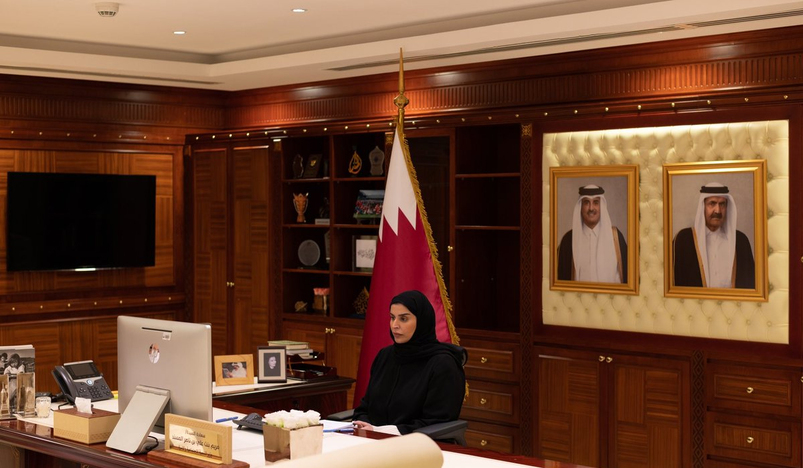
Qatar Highlights Its Experience in Containing COVID-19 Repercussions on Social Sector
The State of Qatar highlighted its experience in responding to the COVID-19 pandemic on the social level and the most important measures to reduce its impact on various segments of society through organized and coordinated efforts that included all social levels.
This came in a speech delivered by HE Minister of Social Development and Family Mariam bint Ali bin Nasser Al Misnad during a high-level Doha Briefing entitled "The Family and COVID-19 Policy Response in the Arab Gulf", organized by the Doha International Family Institute (DIFI) in cooperation with the Executive Office of the Council of Ministers Labor and the Council of Ministers of Social Affairs of the Cooperation Council for the Arab States of the Gulf (GCC), and the Permanent Delegation of the State of Qatar to the United Nations in New York.
HE the Minister referred to the social effects of the pandemic on the social level, in the State of Qatar and other countries of the world, pointing out that the pandemic has reshaped work, education, transportation systems, and even social interactions between families and community circles.
HE Mariam Al Misnad touched on the experience of the State of Qatar in responding to the pandemic at the policy level in the social sector. She referred to some of the measures taken by the state to support families and ensure that they enjoy all services.
She said that despite the austerity measures taken by many countries, the State of Qatar highlighted the importance of investing in the family to support it in times of crisis.
She explained that the state continued to provide social security benefits to about 14,000 beneficiary families, including the elderly, people with disabilities, women, poor families, orphans, and families of prisoners, in addition to answering all inquiries electronically and extending social security cards without the need to go to the concerned authority offices.
Also, Her Excellency indicated that the state continued to provide housing services to support the institution of marriage, and the government decided to exempt all food and medical commodities from customs duties.
Al Misnad pointed out that these exemptions included electricity and water fees for the hospitality sector, tourism, retail, small and medium industries, and commercial complexes, as well as exempting rents for logistic areas and small and medium industries, which reflected positively on the costs of living for families.
She added that the government has postponed the repayment of all loans to productive families and small loans to banks for a whole year without additional costs, to help these families withstand and overcome the pandemic and its negative economic effects.
HE Minister of Social Development and Family explained that the pandemic has remarkably highlighted the leadership role of Qatari women, which had a clear impact on overcoming challenges, through a comprehensive approach characterized by the coordination of efforts between the various sectors of the state, in accordance with a national response plan.
Her Excellency said that women constituted a high percentage of the cadres working in the first ranks to confront the pandemic and protect society, whether in the medical sectors, administrative and service sectors, or civil society institutions.
She pointed out that the efforts of the State of Qatar to contain the COVID-19 pandemic did not stop at the national level but the State of Qatar, under the directives of HH the Amir Sheikh Tamim bin Hamad Al-Thani, worked to enhance international cooperation and human solidarity in combating the COVID-19 pandemic, strengthen the rapid response to its repercussions, and ensure the efficiency of health care and support the neediest families, especially in the least developed countries.
She indicated that the state provided medical and humanitarian assistance to more than 78 countries and financial aid of more than USD89 million.
HE Mariam bint Ali bin Nasser Al Misnad stressed the importance of strengthening cooperation and institutional partnerships between the regional countries for more collective work to enhance family cohesion.
The briefing session came on the sidelines of the 60th Commission for Social Development, which is being held in 2022 under the title "Inclusive and resilient recovery from COVID-19 for sustainable livelihoods, well-being, and dignity for all."
Source: QNA
.jpg)
Qatar Secures Place Among the World's Top 10 Wealthiest Nations
.jpg)
Hamad International Airport Witnesses Record Increase in Passenger Traffic

Saudi Arabia: Any visa holder can now perform Umrah

What are Qatar's Labour Laws on Annual Leave?
Leave a comment